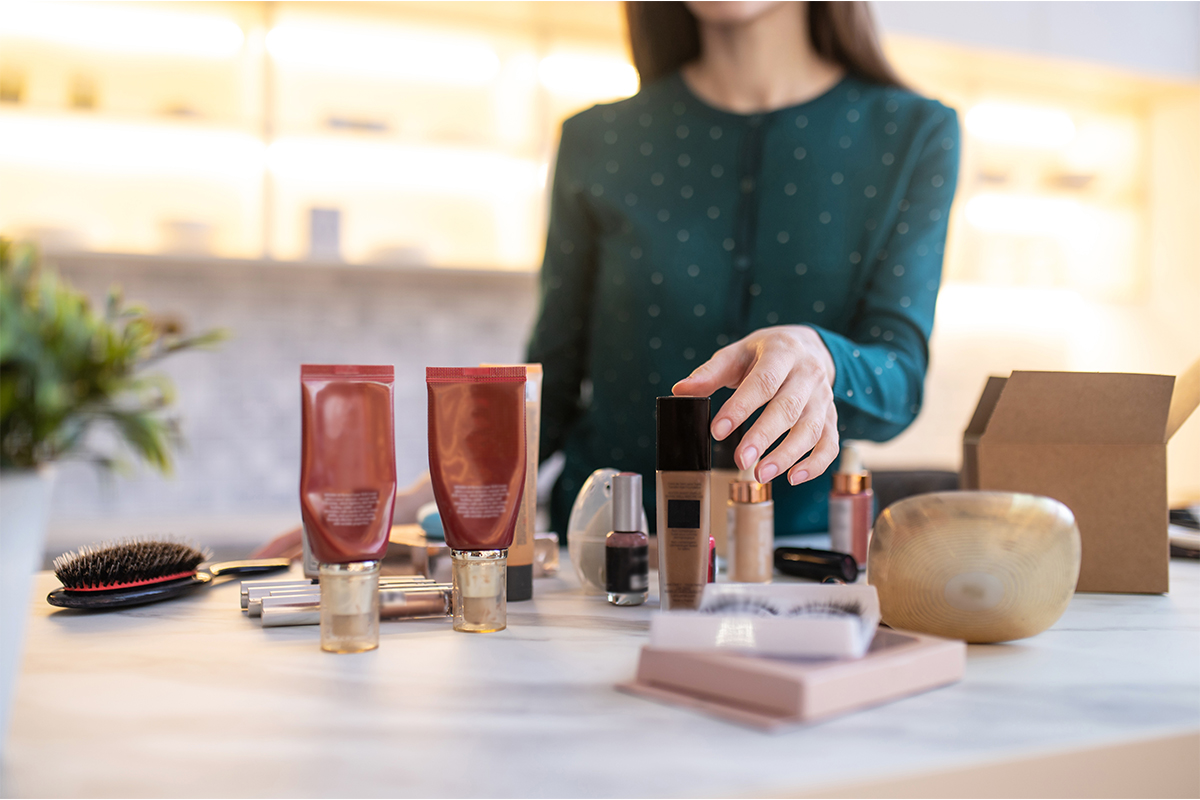Selling Cosmetics Online (2025 Guide)
Selling cosmetics online is a highly regulated e-commerce area that can be successful with the right marketing strategies, after establishing a legal company and making each product compliant with the Ministry of Health's mandatory ÜTS notification and safety standards.

Selling Cosmetics Onlinestands out as one of the most dynamic and high-potential entrepreneurial areas of the digital age. The ever-increasing demand for beauty and personal care products and the rapid shift of consumer shopping habits to e-commerce present unique opportunities for entrepreneurs looking to create their own brands or sell their favorite products.
However, behind this bright facade lies significant responsibilities and challenges that must be carefully managed. Success requires much more than simply displaying beautiful products on a website; it requires full compliance with Turkey's strict Cosmetics Regulation and Ministry of Health regulations, a smart business plan to stand out from the fierce competition, and a solid operational structure built on customer trust.
This guide has been prepared to accompany you step by step in this complex journey from an idea to your first sale, and to show you how you can achieve sustainable success with the right strategies without getting lost in legal labyrinths.
How to Sell Cosmetics Online?

Selling cosmetics online requires much more than simply setting up a website and listing products. A successful e-commerce operation requires meticulous planning, from market research and legal obligations to digital marketing and customer management. Here are the key steps to follow in this process:
Target Audience Identification
The first step to success is clarifying who you're selling your products to. Defining your target audience shapes your entire strategy, from your marketing messages to your product selection.
- Demographic CharacteristicsFactors such as age, gender, income level, and region of residence.
- Interests and ValuesThose who prefer vegan products, those looking for natural and organic ingredients, K-Beauty (Korean cosmetics) enthusiasts, those looking for dermatological products, and those looking for luxury or budget-friendly options.
- Problems and NeedsFor: Teenagers with acne problems, adults looking for anti-blemish products, and those who want to delay the signs of aging.
Market Research and Competitor Analysis
Analyzing the current situation before entering the market allows you to see opportunities and threats.
- Market Size and TrendsWhat is the current size of the cosmetics market in Turkey, what are the popular product categories (skin care, makeup, hair care, etc.) and emerging trends (clean ingredients, sustainability, men's care, etc.)?
- Competitor AnalysisWho are the main players in the market? Which marketplaces and websites do they sell on? What are their pricing strategies, social media usage, and strengths and weaknesses? You can identify your competitors' weaknesses by examining their customer reviews.
Product Category and Niche Selection

Focusing on a specific niche, rather than competing broadly, can help you grow faster. A niche market helps you build a more loyal customer base.
- Example NichesOnly vegan and cruelty-free makeup products, specially formulated dermocosmetic products for sensitive skin, handmade natural soaps and oils, products focusing on the beauty rituals of a particular ethnic group (e.g. African black soap), and grooming sets designed just for men.
E-Commerce Platform Selection
Choosing the digital showcase where you will showcase your products is a critical decision.
- Marketplaces (Trendyol, Hepsiburada, Amazon Türkiye): It allows you to reach a ready customer base quickly, but it has disadvantages such as high commission rates, intense competition and the difficulty of highlighting your brand identity.
- Ready-made E-Commerce Infrastructures (Shopify, Ticimax, Ideasoft): Allows you to create your own branded ".com" website. Offers complete control over your brand identity, flexible design, and marketing freedom. Monthly or annual subscription fees are available.
- WordPress + WooCommerceYou can create a more flexible and customizable website using WordPress, which is open-source and free software, and the e-commerce plugin WooCommerce. However, the technical knowledge and maintenance responsibility are yours.
Legal Requirements and Certificates
The sale of cosmetics is subject to strict regulations because it directly impacts human health. Skipping this step could result in serious legal and financial penalties.
What are the legal requirements for selling cosmetic products online?
Company Establishment and Tax Registration
Establishing a legal company is mandatory for e-commerce, a commercial activity. The most common types are sole proprietorship, limited liability company, or joint-stock company. After deciding on your company type, you must register with the tax office and obtain your tax certificate.
Ministry of Commerce Permits
Your e-commerce website is required to include legal documents such as a "Distance Selling Agreement," a "Preliminary Information Form," and a "Privacy Policy and Personal Data Protection (KVKK) Text." You may also need to register with the Electronic Commerce Information System (ETBİS).
Product Safety and Documentation
Every cosmetic product offered for sale must comply with the "Cosmetics Regulation" established by the Ministry of Health of the Republic of Turkey and be safe for human health. It is essential that the products undergo microbiological and chemical testing.
Labeling and Packaging
There is mandatory information on product labels and packaging. This information must be in Turkish:
- Name and brand of the product
- Name and address of the manufacturer or importer
- Table of contents (INCI format)
- Net amount (gr or ml)
- Expiration date or period of use after opening (PAO symbol)
- Lot or serial number
- Instructions for use and warnings
Advertising and Promotion Rules
According to regulations overseen by the Ministry of Commerce's Advertising Board, it is prohibited to use health claims in the promotion of cosmetic products that mislead consumers, such as claims of therapeutic or curative properties (e.g., "eliminates acne," "treats wrinkles"). These claims must be based on scientific evidence.
Online Store and KVKK Compliance
You are responsible for protecting the personal data (name, address, phone number, email) you collect from your customers. In accordance with the Personal Data Protection Law (KVKK), you must publish a disclosure statement clearly stating the purpose of your data collection and obtain explicit consent from the user.
Billing and Return Policy
You are legally required to issue an invoice (or e-invoice/e-archive invoice) for every sale you make. The consumer has the right of withdrawal within 14 days without giving a reason. However, cosmetic products (creams, lipsticks, etc.) that have been opened, used, or are unfit for resale due to hygiene reasons may be an exception to this right. You should clearly state this in your return policy.
What documents are required to sell cosmetic products online?
Company Establishment Documents
Tax Certificate, Chamber of Commerce or Chamber of Tradesmen and Craftsmen Registration Certificate, Signature Circular.
Business Registration Certificate
Document showing that you are registered with the relevant professional chamber (e.g. Chamber of Commerce).
Ministry of Health Notification Document
Each cosmetic product you offer for sale must be reported to the Ministry of Health's Product Tracking System (UTS) before it is placed on the market. This notification confirms that the product is legally on the market. The manufacturer or importer is responsible for this notification. As a seller, you should request these documents from your supplier.
Import Certificate
If you are importing products from abroad, customs declarations and relevant import permits are required.
Safety Assessment Report
A "Safety Assessment Report" must be prepared for each cosmetic product, assessing the effects of its formula and ingredients on human health. This report is prepared by an expert assessor in the field.
Product Information File (PIF)
The manufacturer or importer must maintain a Product Information File for each product, ready for inspection. This file contains a wide range of technical information, including the product description, safety report, production method, and substantiation of claims. As a seller, you must ensure that your supplier has these documents.
Labeling and Packaging Documents
Documents showing that product labels and packaging designs comply with the Cosmetics Regulation.
Environmental and Waste Management Documents
According to the regulations of the Ministry of Environment, Urbanization and Climate Change regarding packaging waste, companies exceeding a certain sales tonnage may be required to become members of authorized organizations such as ÇEVKO.
Finding Reliable Suppliers

Unless you manufacture your own products, finding the right supplier is vital.
- Domestic Manufacturers/WholesalersCheck the legal compliance of the products (ÜTS registration, documentation, etc.). Test the quality by requesting samples.
- Foreign Suppliers (Import)It is your responsibility to ensure that the product complies with the Turkish Cosmetics Regulation. It is recommended that you work with a customs broker for customs and import procedures.
Product Photos and Descriptions
In the online world where the customer cannot touch the product, visuals are everything.
- PhotosUse high-resolution, bright, and clear photos of the product taken from different angles. Include close-up shots that show off the product's texture and color.
- Remarks: Write SEO-friendly and legal advertising-friendly texts that explain what the product is for, who it is suitable for, its featured content, and how to use it.
Pricing Strategy
When setting your prices, consider the following costs: product cost, packaging, shipping, marketing expenses, commissions, taxes, and your desired profit margin. Analyze competitors' prices, but avoid competing solely on price.
SEO and Keyword Usage
Conduct SEO (Search Engine Optimization) to ensure customers can find you on search engines like Google. Use keywords your potential customers would search for, such as "blemish-reducing serum," "vegan foundation," and "moisturizer for dry skin," in your product titles, descriptions, and blog posts.
Digital Marketing Strategies

Use different channels to drive traffic to your website and generate sales.
- Content Marketing: Add value to your target audience with blog posts (“Top 5 Vitamin C Serums”) and video content (makeup/skincare routines).
- Email Marketing: Send special discounts, new product announcements, and personalized recommendations to your subscribers.
- Influencer Marketing: You can introduce your products to a wider audience by collaborating with influencers in the beauty and care field.
Customer Relationship Management
Customer satisfaction is the key to repeat purchases and loyalty. Respond quickly and courteously to questions, manage product reviews (positive and negative), and use feedback to improve your business.
Return and Exchange Policy
Publish a legal, clear, and understandable return/exchange policy on your website. This process is easy for customers to understand and follow, increasing trust in your brand.
Advertising and Social Media Use
Social media is indispensable for the cosmetics industry, where visuality is at the forefront.
- Instagram and TikTok: Create engagement with product “before and after” images (but not misleading), in-app videos, user-generated content (UGC), and Reels/Shorts videos.
- Facebook/Instagram Ads: Reach potential customers by placing targeted ads based on target audience characteristics (age, interests, etc.).
Campaigns and Promotions
Run strategic campaigns to boost your sales.
- Discounts: Special occasions (Mother's Day, Valentine's Day, New Year's Eve) and seasonal discounts.
- Package/Set Products: Create advantageous sets by combining complementary products (e.g., skin care routine set).
- Free ShippingOffering free shipping over a certain basket amount is one of the most effective sales boosting methods.
Packaging and Shipping Processes
- Packaging: Ensure secure packaging to prevent damage during shipping. Furthermore, aesthetic packaging that reflects your brand identity (branded box, thank-you card, small gift) enhances the unboxing experience and increases customer satisfaction.
- Cargo: Choose fast and reliable shipping companies. Manage the process transparently by providing customers with a tracking number.
FAQ
Do I have to set up a company to sell cosmetics?
Yes, you are required to do so. Income earned from commercial activities is taxable in Turkey. Therefore, to regularly sell cosmetics online, you are legally required to establish at least a sole proprietorship and become a taxpayer.
Can I sell my own handmade creams/soaps? What do I need to do legally?
Yes, you can sell them. However, being "handmade" doesn't absolve you of legal liability. Just like industrial products, you must comply with the Cosmetics Regulation for each product you manufacture. This includes preparing a separate Safety Assessment Report for each product, creating a Product Information File (PIF), registering your products with the Ministry of Health's Product Tracking System (ÜTS), and ensuring your labels comply with legal requirements.
Do I need to get "permission" from the Ministry of Health before selling my products?
No, there's no "permission" process. Instead, there's a "notification" obligation. Every cosmetic product you place on the market must be reported to the Ministry of Health via the Product Tracking System (UTS) by the responsible party (manufacturer or importer). As the seller, it's your responsibility to ensure that the products you sell are registered in this system.
Can I sell the products I bring from abroad (e.g. China, Korea) in Türkiye?
Yes, but in this case, you become the "importer" and assume all legal responsibility. The products you import must be fully compliant with the Turkish Cosmetics Regulation. This process includes:
Preparation of a Safety Assessment Report and Product Information File (PIF) valid in Turkey for each product.
Rearrangement of labels to include mandatory Turkish information.
You register the products to ÜTS.
Correct customs procedures.
Do I need these documents to sell on marketplaces like Trendyol or Hepsiburada?
Absolutely yes. Regardless of the platform you sell on, you are responsible for legal responsibilities. Marketplaces generally request basic documentation from sellers, such as tax certificates, but it's the seller's responsibility to ensure the products themselves comply with the law (ÜTS registration, accurate labeling, safety report, etc.). You will be directly responsible for any audits or complaints.
-
 worgoo
worgoo
